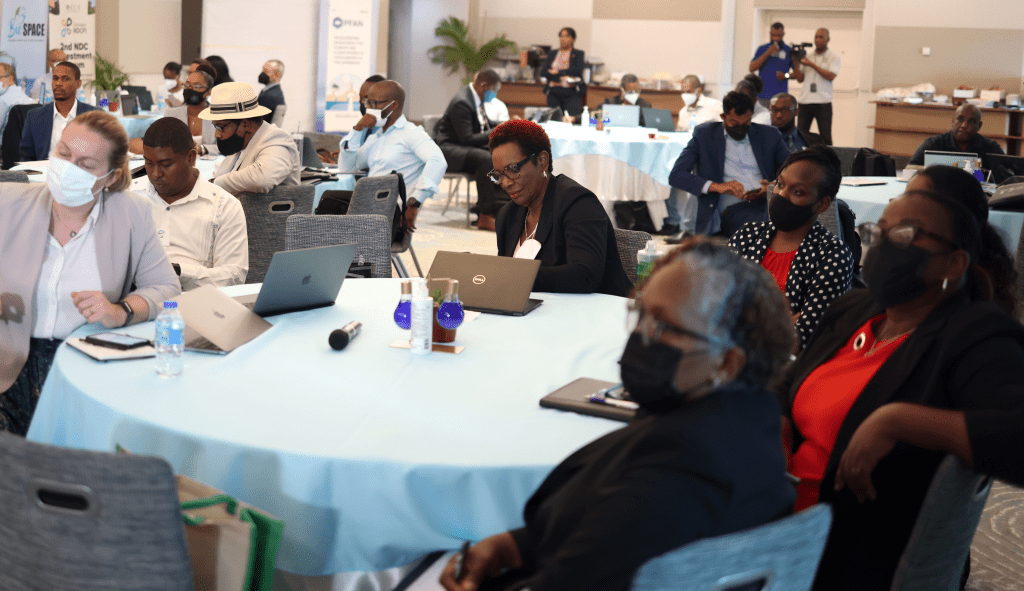
GIZ Media Release
The Gesellschaft für Internationale Zusammenarbeit (GIZ), GmbH launched the 5th phase of the Global Carbon Market (GCM) project on behalf of the German Federal Ministry for Economic Affairs and Climate Protection (BMWK) in 2018. The project supports various partner countries in introducing and using flexible carbon pricing mechanisms and other market-based instruments to mitigate climate change at the national and regional levels. The agreements of the cooperation mechanisms that arise from Article 6 of the Paris Climate Agreement, also became the focus of the project.
Although Small Island Developing States (SIDS) are the lowest contributors to the total global greenhouse gas emissions, their size, geographic location, ecological fragility, and weak economies render them among the most vulnerable to the effects of climate change. Already today, SIDS are increasingly affected by its impacts. According to the latest IPCC report, Caribbean Islands face alarming challenges. It says that 22 million people in the Caribbean who live below an altitude of six meters are particularly exposed to sea level rise, loss of coastal ecosystems and terrestrial biodiversity. Furthermore, intense and more frequent extreme weather events such as hurricanes are projected to cause further destruction of infrastructure and human settlements.
Most Caribbean Island States did not gain any experience with carbon markets as they did not take part in the Kyoto Protocol’s Clean Development Mechanism (CDM) nor made use of other carbon pricing instruments. In 2017, a workshop on carbon pricing was held by the UNFCCC’s Regional Collaboration Centre in St Georges – Grenada (RCC St Georges) in collaboration with MexiCO2, which met great interest. In May 2021, GCM began a cooperation with Grenada and St. Lucia. This period was of great uncertainty in terms of the practical application of Article 6 of the Paris Agreement since the rulebook for Article 6 was only decided at the COP26 in Glasgow 2021. While Article 6 had already set the basic cornerstones for the future of market-based climate change instruments, the Glasgow decisions and the published rulebook helped to clear open points regarding the implementation of the mechanism. These climate policy developments gave the project a decisive boost.
In the short time of GCM Caribbean, the project promoted capacity building and raised awareness in the public and private sector, transferred knowledge and built structures with local (political) actors and institutions. Crucial to the successful development of the project was the close cooperation with the local RCC St Georges, and the Organization of Eastern Caribbean States (OECS) Commission. Through the RCC’s partners and established structures, the project was able to build its own network of contacts and engage with key partners. Over time, the project became a major player in the region for issues related to carbon pricing and market-based instruments.
The primary goal was to demonstrate the carbon markets’ opportunities to the region. A great achievement was the first workshop on “Regional Carbon Markets” in July 2021, which brought together various actors to discuss the regional potential of carbon pricing. National needs could be determined and formulated into specific objectives, such as the need for capacity building. Several workshops took place to provide a general introduction and guidance on the topic of carbon pricing to government officials in St. Lucia and Grenada as well as to actors of the private sector in the region. Furthermore, the publication of the handbook on the practical application of Article 6 of the Paris Agreement by CARICOM with support from GCM is a major achievement of the project. The handbook was well received and has already been applied in practice. The project also co-hosted a virtual side event at the Climate Summit for Latin America and the Caribbean, which provided a platform for experts to discuss the conditions for promoting carbon pricing mechanisms in the region.
The Caribbean component is actively supporting the establishment of the Caribbean Alliance on Carbon Markets and Climate Finance, which was first discussed with relevant stakeholders in July 2022. The alliance aims to promote cross-regional exchange among Caribbean Island countries on carbon markets. Moreover, the project will increase work with various partners on implementation, readiness, and transactional issues specific to the Article 6 context. The preliminary work done in the Caribbean project provides a good starting point for other SIDS that want to work on carbon pricing in the future. All stakeholders who are planning similar activities or would like to get more information are invited to contact the project.